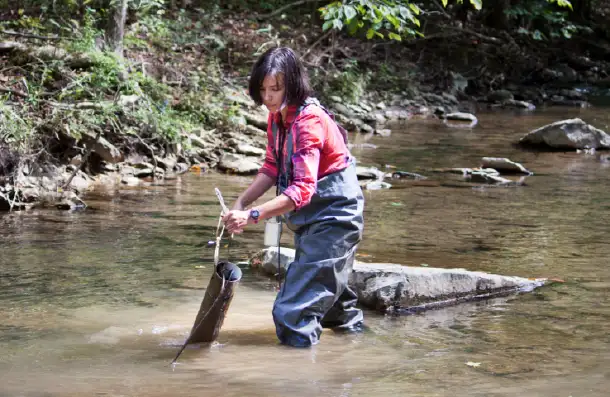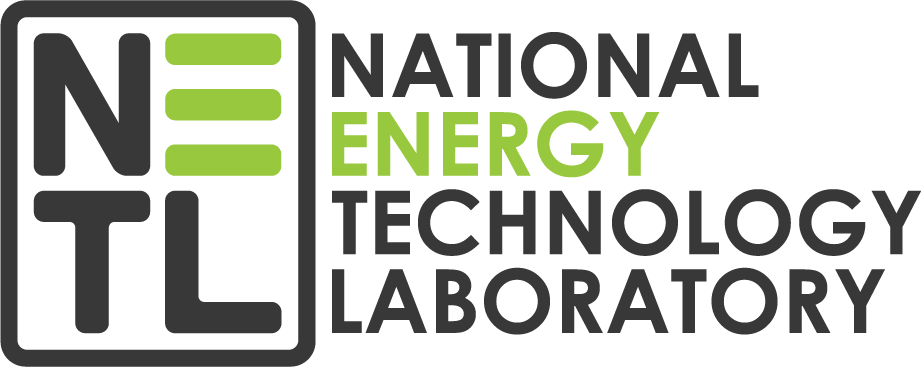Professional Internship Program participant analyzes risks to water quality from hydraulic fracturing
Meet Aubrey Harris
West Virginia University graduate student Aubrey Harris knows the value of water on a biological, economic, and social level. She's also aware of its importance in energy production. That's why she's passionate about ensuring the nation's need for energy doesn't undermine the quality of our water supply.

In the Professional Internship Program at NETL, engineering graduate student Aubrey Harris is investigating ways to keep hydraulic fracturing from contaminating the nation’s water supply.
As a Professional Internship Program (PIP) participant at the National Energy Technology Laboratory (NETL) in West Virginia, she is pursuing research that will provide the natural gas industry with tools for safer hydraulic fracturing.
Hydraulic fracturing is a method of natural gas extraction that requires drilling down into the ground and injecting highly pressurized water with chemical additives to break up shale rocks and allow the natural gas to flow into the well. It has sparked numerous health and environmental concerns, as the chemicals and returned fluids may be able to leak into surface water or groundwater and contaminate drinking water supplies.
"The purpose of my research is to determine how and when these contaminants might reach the accessible environment and the changes we might expect to see in water quality due to hydraulic fracturing accidents or normal operations," said Harris, a master's student in civil and environmental engineering. "The goal is to reduce the uncertainty of risks associated with large-scale development."
In order to measure the potential impacts of hydraulic fracturing surface spills in the environment, Harris makes field observations to create models of chemical spills and investigates pathways for contaminant transport. She also runs laboratory tests on water quality monitoring instruments to determine how precisely the instruments can detect chemicals associated with spills.
The PIP program is administered through the Oak Ridge Institute for Science and Education, which is managed by ORAU for DOE, and is designed to introduce undergraduate and graduate students to the challenges of energy research. Alongside world-class scientists, students use state-of-the-art equipment to conduct basic and applied research that addresses pressing national problems. Harris is participating in the program alongside her mentor, geologist Daniel Soeder.
Harris was a former member of the national service program AmeriCorps VISTA (Volunteers in Service to America), where she worked with a community watershed organization and witnessed community dedication to preserving water resources. The PIP internship allows Harris to serve on the front lines of the water quality issue, addressing the problems at the core.
"I hope my research will provide tools for the industry and other watershed stakeholders to identify and mitigate accidents or poor management practices associated with unconventional resources," she said. "I also want to negate any inappropriate conclusions the lay community has made with the risks in natural gas development. The information regarding accidents and contamination events are not readily available to the public, so there has been a history of distrust among community members and industry."
Harris teams up with scientists across the lab to advance her research goals. This networking factor is one of her favorite parts of the program.
"I enjoy collaborating with people from different scientific backgrounds. Together, we are investigating many aspects of the research question," she said. "The teamwork has been great for preparing me to work with people of different skills and backgrounds in the future."
Harris envisions herself as a professional engineer, possibly designing methods and technology to ensure the sustainable use of water and electricity. In the PIP program, she's honing professional skills to make that a reality.
"This has been a great opportunity to work with scientists and professionals, and I feel like I have been exposed to cutting-edge issues in the field of energy resources," she said. "I think the experiences I've had have shown me different facets of research: identifying an unknown and applying one's own knowledge to investigate it. I would recommend this program to others."


